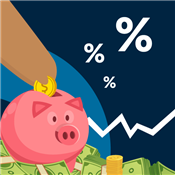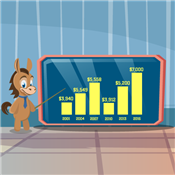3 Types of Savings Accounts
Ad Disclosure: This article contains references to products from our partners. We may receive compensation if you apply or shop through links in our content. This compensation may impact how and where products appear on this site. You help support CreditDonkey by using our links.
Grow your money with a savings account. There are several account types depending on your needs. Learn about the different savings options.
 |
The 3 common savings account types are regular deposit, money market, and CDs.
Each one works a little different regarding accessibility and amount of interest. Besides these accounts, there are other savings options too.
It can get confusing to know which one is best for your needs.
Check out the differences between each type of account. Or simply visit the top savings accounts:![]()
![]()
![]()
![]()
![]()
![]()
![]()
![]()
![]()
![]()
![]()
![]()
![]()
![]()
![]()
High-Yield Savings Premier - 5.31% APY
- No account activity or maintenance fees
- $500 minimum opening deposit
- FDIC insured
3 Main Types of Savings Accounts
 |
Here is a quick overview and comparison chart to understand the differences between the three main savings accounts.
- Regular savings accounts are best for emergency funds and short-term goals
- Money market accounts are best if you need more flexibility
- CDs are best for keeping funds that you don't need anytime soon
| Basic Savings | Money Market | Certificate of Deposit | |
|---|---|---|---|
| Monthly fees | Varies by bank | Varies by bank | None |
| Minimum balance | Varies by bank | Varies by bank | May require higher balance |
| Interest | Interest rate can change according to the economy | Interest rate can change according to the economy | Interest rate is locked in for entire term; usually offers higher APY for longer terms |
| Accessibility | Limited to 6 withdrawals per month | Limited to 6 withdrawals per month; may also offer check writing, bill pay, and debit card | Cannot withdraw funds before end of term, or you'll incur a penalty |
| Deposits | Can make unlimited deposits | Can make unlimited deposits | Usually cannot add more funds once account has been opened |
| FDIC insured | Yes | Yes | Yes |
Savings accounts, money markets, and CDs are all FDIC insured. Your combined deposits are covered up to $250,000 should the bank fail.
1. Basic Savings Account
Best for: Emergency funds and short-term savings
A basic savings deposit account is simply a place to store your money. Since the goal is to save money, federal law limits you to 6 withdrawals or transfers each month.[1] If you exceed that amount, a withdrawal penalty will apply.
Because of the limited flexibility, a savings account is not meant to be used for day-to-day expenses. They're an ideal place to keep money for your emergency savings and short-term goals.
Often, savings accounts offer interest to help your money grow. The rate varies depending on the financial institution. Online savings accounts usually offer the highest rates.
A savings account makes a great partner to a checking account. Most banks allow you to link them together for overdraft protection. This way, if you accidentally overdraw your checking, funds from your savings account can be used to cover it.
|
|
High-Yield Savings Premier - 5.31% APY
- No account activity or maintenance fees
- $500 minimum opening deposit
- FDIC insured
Discover® Online Savings - $200 Cash Bonus
To qualify for Bonus: Apply for your first Discover Online Savings Account, enter Offer Code CY624 at application, deposit into your Account a total of at least $15,000 to earn a $150 Bonus or deposit a total of at least $25,000 to earn a $200 Bonus. Qualifying deposit(s) may consist of multiple deposits and must post to Account within 45 days of account open date. Maximum bonus eligibility is $200.
What to know: Offer not valid for existing or prior Discover savings customers, including co-branded, or affinity accounts. Eligibility is based on primary account owner. Account must be open when bonus is credited. Bonus will be credited to the account within 60 days of the account qualifying for the bonus. Bonus is subject to tax reporting. Offer ends 09/12/2024, 11:59 PM ET. Offer may be modified or withdrawn without notice. See advertiser website for full details.
CIT Bank Platinum Savings - 5.00% APY
- 5.00% APY with a balance of $5,000 or more
- 0.25% APY with a balance of less than $5,000
- $100 minimum opening deposit
- No monthly maintenance fee
- Member FDIC
2. Money Market Account
Best for: Those who want more flexibility and access to their money
A money market account is like a hybrid savings and checking account. You're still limited to 6 withdrawals a month, but you get a little more flexibility and easier access to your money.
A lot of money market accounts allow for check writing and online bill pay (which is not allowed in traditional savings accounts). Some even come with a debit card you can use for purchases and ATM withdrawals. This makes your funds more liquid. You'll have to check which features your MMA offers.
Note that writing checks, paying bills, and making purchases all count toward the 6 transactions/month limit.
Money market accounts may offer higher interest rates than savings accounts. However, in exchange, some banks will require a larger initial deposit or higher minimum account balance. Again, rates and requirements will vary. Check out the best money market rates.
|
|
Money Market Deposit Account - 5.25% APY
- No fees
- $1 minimum deposit to open
- 24/7 online access to funds
- Federally insured by NCUA
Money Market Deposit Account - 5.24% APY
- $1 minimum deposit
- No fees
- 24/7 online access to funds
- Federally insured by NCUA
Money Market Deposit Account - 5.23% APY
- $1 minimum deposit
- No fees
- 24/7 online access to funds
- Federally insured by NCUA
3. Certificate of Deposit
Best for: Earning a higher interest rate on money you don't need anytime soon
Certificates of Deposit (CDs) work differently. It requires you to deposit a fixed amount of money for a fixed amount of time. You get a fixed interest rate for the entire duration of the term. The benefit of this is even if there's a federal cut on interest rates, your rate stays the same.
Typically, the longer the term, the higher interest rates. You cannot add more funds once the CD is opened.
Whatever CD term you choose, you must keep your funds there until maturity. If you want to take your money out sooner, you'll face steep penalties (usually a few months' worth of interest).
For these reasons, CDs should only be used for storing cash that you know you won't need for that length of time. If you don't need that money soon, you can look for the highest possible interest rates. See the best CD rates.
|
|
Certificate of Deposit
- 4.70% APY for 12-month term
- 4.40% APY for 18-month term
- 3.75% APY for 36-month term
- 3.75% APY for 5-year term
9-Month High-Yield CD - 5.05% APY
- No fees
- $1 minimum deposit
- 24/7 online access to funds
- FDIC insured through California Bank of Commerce
CIT Bank Term CDs - Up to 3.50% APY
- Up to 3.50% APY
- $1,000 minimum opening deposit
- No monthly maintenance fee
- Member FDIC
| Term | CD Rates |
|---|---|
| 6 Month | 3.00% APY |
| 1 Year | 0.30% APY |
| 13 Month | 3.50% APY |
| 18 Month | 3.00% APY |
| 2 Year | 0.40% APY |
| 3 Year | 0.40% APY |
| 4 Year | 0.50% APY |
| 5 Year | 0.50% APY |
Some banks offer special CDs with a little more flexibility. You may also see these options:
- No penalty CDs: You can withdraw early with no penalty
- Step-up/Bump-up CDs: You can adjust your interest rate during your term if rates increase
- Add-on CDs: You can add more money during the term
Retirement Savings Account
 |
If you're saving for retirement, it's best to open a specialized retirement account.
Individual Retirement Accounts (IRAs) are dedicated accounts just for retirement funds. You can only withdraw funds without penalties after age 59½. The biggest benefit is that IRAs offer tax advantages. There are two types of IRA accounts:
- Traditional IRA: Your contributions are tax deductible, so you can save on taxes now. But you will pay normal income taxes when you withdraw later at retirement age.
- Roth IRA: Your contributions are made with after-tax dollars. They're not tax deductible, but your withdrawals are all tax-free, including any earnings.
IRAs have an annual contribution limit. For 2020, the maximum contribution per year is $6,000 ($7,000 if you're 50 or over).[2]
You can open an IRA investment account at online brokerages. This allows you to invest your money for more growth potential, so you have a better chance of hitting your retirement savings goals.
Other Special Types of Savings Accounts
Here are other special savings account types that you may see.
High-yield savings account
This refers to savings accounts with higher-than-average interest rates. Usually these are found at online banks. They typically offer higher rates because of the lower overhead.
Joint savings accounts
A joint account is one that you open with another person. You will both be co-owners of the account. For example, spouses can open a joint account together. Or a minor can open a joint account with a parent.
Kids/teen savings accounts
Kids can get a head start on saving and learning healthy money habits. A parent will have to be a co-owner until the child turns 18.
Student savings accounts
This account type is offered to college students. Usually student accounts offer more lenient terms, like no maintenance fees or balance requirements.
Business savings accounts
It's best for businesses to have a separate banking account from your personal account. A business savings account is a good place to keep your business cash reserves. Pair this with a business checking account.
Cash management accounts
These are a special type of accounts offered by brokerage firms. It's a good option if you want to keep your savings and investments under the same roof. Another advantage is that brokerages often don't have a limit on the number of withdrawals each month.
Health Savings Account (HSA)
A health savings account is used for medical expenses and has tax benefits. Your contributions are tax deductible and withdrawals are tax-free if used for qualified medical expenses. It's good for those with health insurance plans with high deductibles.
What to Look for in a Savings Account
When deciding on the right savings account for you, consider these factors:
- Opening deposit requirement: An account with no minimum means you can start saving no matter how little or how much money you have.
- Monthly service fee: Some banks may charge a fee if you don't maintain a minimum balance each month. Is the requirement reasonable for you? If you don't want to worry about this, look at online savings accounts.
- Interest rate: Of course you want to earn interest. Look for the highest annual percentage yield (APY) possible, but also consider other features. For example, you may prefer the easy access of a money market account, even if the interest rate is slightly lower.
- Features: Does the account offer an ATM card or other features you may want?
- Transaction limits and penalties: Federal regulations limit savings accounts to 6 transfers/withdrawals per month. Banks have their own policies and penalties for exceeding the limit.
Some banks simply stop the transactions in excess of the limit, while others will impose a fee. Some banks may even close your account and convert it into a checking account if you regularly exceed the limit.
Where to Open a Savings Account
To open a savings account, first you need to decide on a financial institution. You have three main options. Each one has their pros and cons.
Traditional bank
Traditional banks have physical branches. These can be large nationwide banks (like Chase, Citibank and Bank of America) or smaller regional banks.
Benefits of brick-and-mortar banks is that you can get in-person help and more services, such as loans, credit cards, and other financial products. But the trade-off is that they tend to have more fees and balance requirements.
Online bank
Online banks don't have physical locations. Because of the lower overhead, they often eliminate many typical banking fees. But you have to be comfortable with banking entirely online.
Credit union
A credit union often provides better personalized service and lower fees. They usually service a certain area, so the availability may not be as great. But many online credit unions now also allow anyone to become a member. The NCUA insures your deposits at credit unions up to $250,000.
How to Open a Savings Account
- Gather information
You'll need several pieces of information in order to open a bank account:- Government-issued ID, like a driver's license
- Social Security number
- Basic personal information (name, home address, email address, phone number)
- Date of birth
- Proof of address (lease or utility bill)
- Government-issued ID, like a driver's license
- Fill out application
You can apply online or in person. If you apply online, you may need to send in your ID and proof of address as part of the approval process.Most financial institutions will run a credit check on you to see your past banking history and then approve or deny you for the account. This is just a soft pull and will not hurt your credit score.
- Make initial deposit
Finally, just fund your account. If your savings account has an initial deposit, you will be required to deposit at least that amount. If your bank doesn't have an opening requirement, then you can fund it whenever you wish.You can fund your account by electronic transfer, wire, or physical check.
High-Yield Savings Premier - 5.31% APY
- No account activity or maintenance fees
- $500 minimum opening deposit
- FDIC insured
Discover® Online Savings - $200 Cash Bonus
To qualify for Bonus: Apply for your first Discover Online Savings Account, enter Offer Code CY624 at application, deposit into your Account a total of at least $15,000 to earn a $150 Bonus or deposit a total of at least $25,000 to earn a $200 Bonus. Qualifying deposit(s) may consist of multiple deposits and must post to Account within 45 days of account open date. Maximum bonus eligibility is $200.
What to know: Offer not valid for existing or prior Discover savings customers, including co-branded, or affinity accounts. Eligibility is based on primary account owner. Account must be open when bonus is credited. Bonus will be credited to the account within 60 days of the account qualifying for the bonus. Bonus is subject to tax reporting. Offer ends 09/12/2024, 11:59 PM ET. Offer may be modified or withdrawn without notice. See advertiser website for full details.
CIT Bank Platinum Savings - 5.00% APY
- 5.00% APY with a balance of $5,000 or more
- 0.25% APY with a balance of less than $5,000
- $100 minimum opening deposit
- No monthly maintenance fee
- Member FDIC
Bottom Line
The right savings account for you depends on your goals and needs. Regular deposit savings accounts are great for things like an emergency fund and short-term goals, while money market accounts offer more liquidity. CDs can offer higher savings rates as long as you can make the commitment to not touch your money. And IRAs are ideal as part of your retirement plan.
Remember that the definition of savings accounts is to save money, so they're not meant to be used like checking accounts.
References
- ^ Federal Reserve, Regulation D, Retrieved 11/30/2020
- ^ IRS, IRA Contribution Limits, Retrieved 11/30/2020
Write to Anna G at feedback@creditdonkey.com. Follow us on Twitter and Facebook for our latest posts.
Note: This website is made possible through financial relationships with some of the products and services mentioned on this site. We may receive compensation if you shop through links in our content. You do not have to use our links, but you help support CreditDonkey if you do.
|
|
|

















